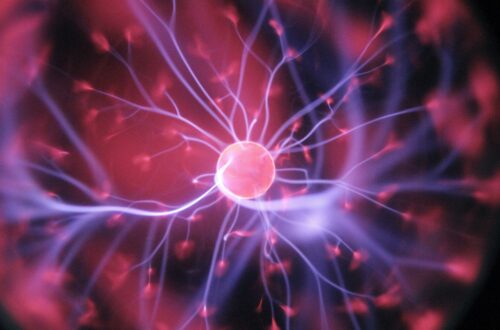
Quantum Physics and Intelligent Design
In my last article I explored the philosopher and mystic, Alan Watts’ view of intelligence in the universe. He defined intelligence as patterning. claiming there were two types of patterning: Organic and Mechanical.
Mechanical patterns are created by an outside agent, usually a human, whereas organic patterns are self-creative. In other words, the patterning itself is intelligent.
This leads me to want to explore the old argument of Intelligent Design, but from a new perspective, using quantum physics to draw a different conclusion.
St. Thomas Aquinas’ Argument From Design
St. Thomas Aquinas (1225-1274) gave the first sophisticated version of this argument for the proof of God’s existence.
He said,
“We see that things which lack intelligence, such as natural bodies [acorns for instance], act for an end, and this is evident from their acting always, or nearly always, in the same way, so as to obtain the best results. Hence it is plain that not fortuitously [by mere chance], but designedly, do they achieve their end. Now whatever lacks intelligence cannot move towards an end unless it be directed by some being endowed with knowledge and intelligence; as the arrow is shot to its mark by the archer. [Italics Mind] Therefore, some intelligent being exists by whom all natural things are directed to their end; and this being we call God.”
Aquinas is saying that whatever lacks intelligence (in this instance an acorn) unless it is directed by some being with intelligence, cannot move toward an end (becoming an oak tree). He then uses the example of arrow which can never reach its target unless someone shoots it.
That Being, endowed with intelligence, that directs an acorn to become an oak tree, is God. Without that direction the acorn would just lie there like a piece of driftwood and go nowhere.
William Paley’s Argument From Design Update
British philosopher and priest, William Paley (1743-1805) came up with a more modern version of this argument. Briefly summarized, it goes like this:
You’re walking along the beach. Blue sky, big waves, white clouds. You find a pocket watch lying in the sand and pick it up. The watch is keeping perfect time. Opening the back of the case, you observe the precise motion of the tiny parts. Each jeweled gear and coiled spring moves with perfect regularity. So do we believe this watch was created over centuries of rain, wind, sunlight and soil erosion or do we believe it was created by a watchmaker.
Most would say a watchmaker. So if something as complex as a watch must have been created by a watchmaker, wouldn’t we also conclude that this universe, far more intricate and complex than a watch, must also have been created by a universe-maker, which is God.
Critiquing the Argument From Design
Some people criticize this argument because a watch is a mechanical object and the universe is a natural object. But for my purposes that doesn’t matter. Both the mechanical object and the natural object reveal Watt’s mechanical patterning. Both were created by an outside agent according to the arguments from design.
I have a bit of a problem with Aquinas’ argument, disagreeing with him that an acorn lacks intelligence. It has the intelligence embedded in it as part of the 13.8 billion-year evolutionary process which, as I argued in my previous article, is an example of organic patterning and is intelligence itself.
But, the overall problem is that both design arguments are trying to prove a God that exists external to the universe she/he created. I want to argue that the universe itself is creative and intelligent. It doesn’t need an outside agent.
If we return to Watts’ distinction between organic and mechanical patterning, we can see that the argument from design represents mechanical patterning. God is the outside agent who designs and creates the universe as any carpenter would design and create a desk or a cabinet.
The overall view here is that an outside intelligence bestows its intelligence on dumb matter. As with the acorn, I want to argue that matter itself embodies intelligence.
The Quantum Physics Perspective
We can use the discoveries of quantum physics to make our point. The problem with the above arguments from design is that they posit dualism. We have a non-physical world (God, Mind) and a physical world (matter). From this perspective, these two substances are completely different. For one thing, one has intelligence and the other doesn’t. There are other differences, but we need not trouble ourselves with them now.
However, if we attempt to actually define the substance of each, what do we come up with? First off we have God. What is the substance of God? It is nothingness, or rather “no-thingness”. God is not a thing, but an emptiness. There is no there, there, materially speaking.
Now, what is the substance of matter? During Paley’s time, matter was thought to be made of atoms which were then thought to be solid balls of “stuff” that couldn’t be further sub-divided. In fact, the Greek word for ‘atom” is atomo which means, “can’t be divided” or “indivisible”.
But now we know that definition for atoms no longer holds. Atoms can be divided into subatomic particles and further sub-divided, ultimately reducing them to emptiness or “no-thingness”. Matter, in short, is made of the same substance as God. That tells us there is no separation between the two. God is the universe and the universe is God. The universe, therefore, is not dual, but non-dual.
All the arguments for intelligent design work if your conclusion is not that a separate God exists, but rather that Intelligence itself exists. We then see that there is no separation between God/Intelligence and the world. “God/Intelligence”, in short, is the world. It is all intelligent because “God/Intelligence” or whatever term you prefer, is embedded in the whole process.
These arguments for design show there is only intelligence and therefore everything, even an acorn, has intelligence.
To learn more about the magic of the universe: Click this link: The Magical Universe.




